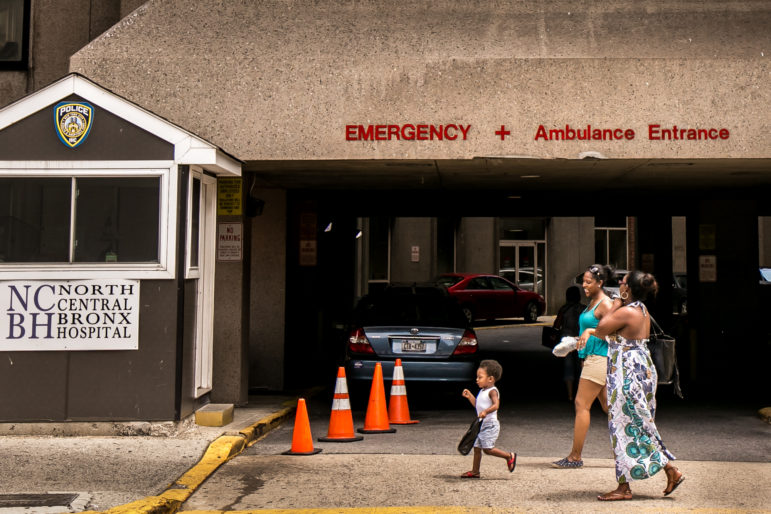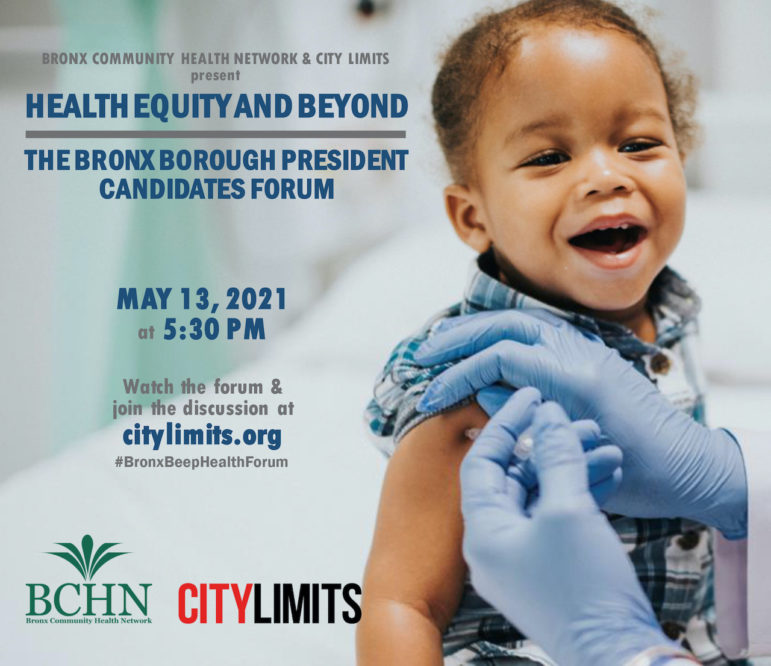Tune in for a forum on health, healthcare and the disparities that put the Bronx at risk from everyday chronic disease and once-in-a-century pandemics.

Adi Talwar
Entrance to the ER at North Central Bronx Hospital.At first it just seemed like a few cases of respiratory disease. But it soon became evident that the illnesses were serious, and then that there was a cluster of them, and that they were linked.
Within a few days, the city’s public health machinery swung into action. An incident command system was activated. Health investigators hit the streets. And a citywide alert went out, warning that doctors “should consider Legionnaire’s disease when evaluating patients presenting with signs of pneumonia.”
The 2015 Legionnaire’s outbreak involved a different disease and a vastly different scale of sickness and death than the 2020-2021 COVID-19 disaster. But the two health crises, which more or less bookend the de Blasio administration, both particularly affected the Bronx: the Legionnaire’s cases were clustered in the South Bronx, and the Bronx has suffered the highest COVID-19 death rate of any borough.
And in both cases, socioeconomic factors like poverty, proximity and a prevalence of chronic health conditions increased the danger from the disease.
From obesity to diabetes to asthma, the Bronx is profoundly and disparately affected by health problems. That’s why the Bronx Community Health Network (BCHN), a nonprofit that sponsors 21 community and school-based health centers in the borough, and City Limits are teaming up on a candidate forum focused on health and featuring four people running to be the next borough president.
The forum will be held online on Thursday, May 13 at 5:30 p.m. It can be viewed via Zoom (register here) or on City Limits’ YouTube channel or homepage. (The first official Democratic mayoral debate is later that evening, at 7 p.m.)
Councilmember Fernando Cabrera, Assemblywoman Nathalia Fernandez, Councilmember Vanessa Gibson and retired NYPD Lt. Samuel Ravelo have agreed to participate. The fifth person on the ballot for Bronx BP, State Sen. Luis Sepulveda, has not.
The office of the borough president does not have extensive powers and controls a relatively small share of the city budget, but it has the potential to serve as a spokesperson and ambassador for the borough—and the flexibility to focus on whatever issues the occupant deems most important. And health can be among those: In the 1990s, Bronx BP Fernando Ferrer devoted his efforts to closing illegal “Medicaid mills.” More recently, BP Ruben Diaz Jr. has operated a campaign, #Not62, targeting chronic health conditions that often see the Bronx ranked as the 62nd and least-healthy county in the state.
Early voting in the primary race to replace Diaz, Jr., as “beep” begins June 12. Primary Day is June 22. The next BP won’t be formally elected until November, although the Bronx has not had a Republican borough president since 1965.









